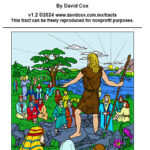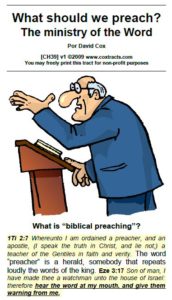ch34 Brethren, we must not fight! explains why Christians should not be contentious, especially between brethren.
Brethren, we Must Not Fight!
By David Cox
[ch34] v1r © 2009 www.coxtractscom
You can freely photocopy and print this brochure
But about brotherly love you don’t need me to write to you, because you yourselves have learned from God that you love one another; 1Thes. 4:9
The Bible speaks of a Christian as a person who has a different personality. This person who is saved is someone who seeks to impose brotherly love in his life, in that he loves his brethren. This is a change from the carnal life he was in before he was saved, “living in malice and envy, loathsome, and hating one another.” (Titus 3:3).
Because it is important?
1Jn. 4:7 Beloved, let us love one another; because love is from God. Everyone who loves is born of God, and knows God. 8 He who does not love does not know God; because God is love.
Perhaps it is not very obvious why brethren should not fight, but God hates brethren when they are fighting. First, we have to understand that God in his essence is love. Aggression, friction, strife, and fighting are things that God opposes. They are from the Devil. When two brothers get into a fight, then they are lending themselves to the Devil’s purposes. It is not God. But much more than “God doesn’t like it,” God says his children have to learn, understand, and practice love.
1Jn. 2: 9 He that says he is in the light and hates his brother, is still in the darkness. 10 He who loves his brother abides in the light, and in him there is no stumbling. 11 But he who hates his brother is in the darkness, and walks in the darkness, and does not know where he is going, because the darkness has blinded his eyes.
God proposes a union and friendship between His children, in which a brother helps and supports his brother in what he does in life. When two people are brothers and fight, then God says that they walk in darkness and that they stumble.
1Jn. 3:10 In this the children of God are manifested, and the children of the devil: everyone who does not do justice, and who does not love his brother, is not of God.
If a person does not love his brethren, then it is manifested that he is not a child of God.
1Jn. 3:14 We know that we have passed from death to life, because we love our brothers and sisters. He who does not love his brother remains in death.
The mark that a person is truly saved is that they love their brother, they do not fight, and they tend to not enter into conflicts and in contentions with their brethren. The Christian understands that God commanded that we have brethren, to have a relationship with them. In demonstrating the love of one brother to another, reveals his faith in Christ. Resistance in fighting or seeking to contend with your brethren is something that draws attention to whether one is saved or that one is still unconverted.
1Jn. 3:15 Everyone who hates his brother is a murderer, and you know that no murderer has permanent eternal life in him. 16 By this, we have known love, in which he laid down his life for us; we too must lay down our lives for the brethren. 17 But whoever has the world’s goods and sees his brother in need, and closes his heart against him, how does the love of God abide in him?
God puts love, being friendly, ignoring, hating, and murderous all on the same line. They are actually degrees of the same thing, your relationship with your neighbor is a reflection of your relationship with God. At one extreme is love, in which one dies for the other. At the other extreme is the murderer. Everything between the two is degrees from one extreme or the other. In addition, brethren share what they have in this life.
Mat. 5:43 You have heard that it was said: You shall love your neighbor, and you shall hate your enemy. 44 But I say to you: Love your enemies, bless those who curse you, do good to those who hate you, and pray for those who abuse and persecute you;
When a person understands (1) the love of God,
(2) what the moral character of God is like, (3) that God is love, (4) that God is not aggressive, and contentious, then one understands God and our common salvation. It is very important to understand that everything is based on two points, as Jesus emphasized.
Mat. 22:37 Jesus said to him: You shall love the Lord your God with all your heart, and with all your soul, and with all your mind. 38 This is the first and greatest commandment. 39 And the second is similar: You shall love your neighbor as yourself. 40 On these two commandments hang all the law and the prophets.
Salvation and the whole Christian life is based on our relationship with God, and on how we demonstrate this spiritual relationship, especially on how we accept and imitate him (Eph. 5:1 “Be imitators of God as beloved children“) i.e. nature and moral character of God, and then how we manifest this change of moral character in us to be like God through how we relate to other people (our neighbor, especially our brethren).
Irritating one another
1Co. 13:5 Love is … not irritated.
Gal. 5:26 Let’s not become boastful, irritating each other, envying one another.
God commands us not to irritate each other. The idea here is to provoke, to call for conflict and contention. A Christian is a person who seeks peace, not conflict. As Christians, we sometimes have to face even our brethren when they disobey the will of God the Father, but in general, we must be people who love their neighbors and brethren, forgetting and covering up their offenses and not seeking conflict and contention with them.
Biting and wasting away
Gal. 5:15 But if you bite and eat one another, see that you also do not consume one another.
Between the brethren, when they start attacking and destroying each other then they end up killing each other. The idea is taken literally from one animal that attacks and turns against another to such an extent that it consumes the other.
The Relationship Between One Another
Jn. 13:34 A new commandment I give you: Love one another; as I have loved you, that you also love one another.
Jn. 15:12 This is my commandment: that you love one another, as I have loved you.
Jn. 15:17 This I command you: Love one another.
Rom. 13: 8 Owe no one anything, except to love one another; for he who loves his neighbor has fulfilled the law.
It is essential to see the importance that Jesus placed on his children having a loving relationship with each other. This relationship defines and reveals the moral character of God, and one announces God living within them by living in this way.
Upholding one another and putting up with one another
Col. 3:13 bearing with one another, and forgiving one another if anyone has a complaint against another. As Christ forgave you, so do you.
Simply put, if one is saved, he supports and endures his brethren. We seek peace, forgiving each other if we are children of God.
Forgiving one another
Eph. 4:32 But be kind to one another, merciful, forgiving one another, as God also forgave you in Christ.
If you seek and want to be forgiven by God, then He gives you the test of someone offending you so He can see if you really want forgiveness IN YOUR OWN LIFE. If you want to be forgiven by God, then you will also forgive others, bearing their offenses, not holding a grudge and envy against them. God sees the sincerity of your heart toward the salvation that God gives you through how you forgive other people who offend and annoy you.
Exhorting and teaching you
Col. 3:16 The word of Christ abundantly dwells in you, teaching and exhorting one another in all wisdom…
When we understand the Bible and the will of God, then we understand that it is our task as children of God to be those who proclaim the virtues of God (“that you proclaim the virtues of him who called you ” 1Pet 2:9). In this, we explain and live God’s word (God’s will in words and actions) for others. We encourage and teach, but we do not litigate or be aggressive and conflictive in nature.
Cheer up and build yourselves
1Thes. 5:11 Wherefore encourage one another, and build one another up, just as you do.
The truth of a saved person is that he encourages and edifies his brethren instead of fighting with them.
Download
ch34-cox-brothers-must-not-fight.pdf (10638 downloads )
More Tracts from the Church Category
Author Pastor David Cox

See also Why People leave your church (posts November 6, 2020)











